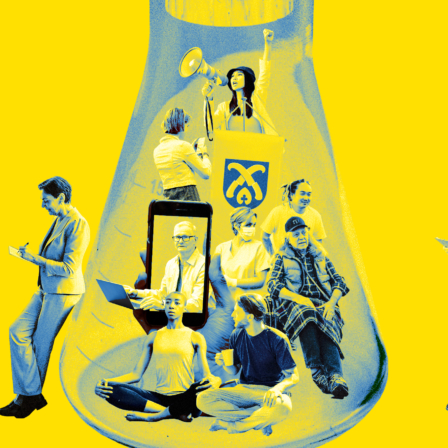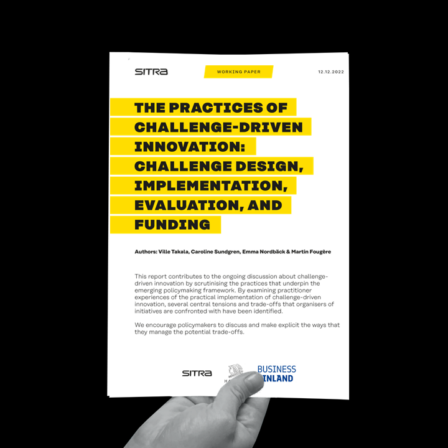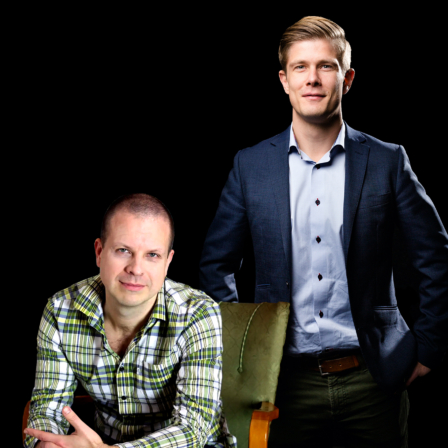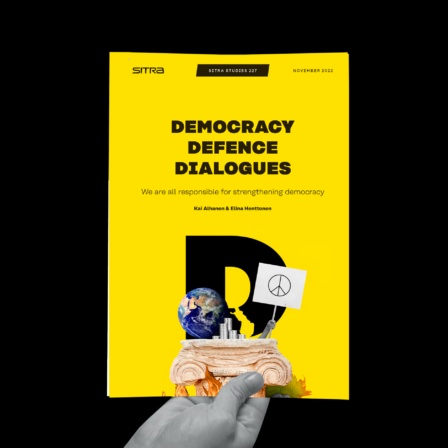This report focuses on the work of multidisciplinary teams with wicked problems. It is based on the analysis of extensive empirical observation and interview data, and describes the activities of four teams in the Sitra Lab training programme during 2020, the year of the COVID-19 pandemic. The training programme focused on finding solutions from nature to the problems of urbanisation. The pandemic situation made it necessary that the participants adapt to the use of new kinds of tools for remote work to create a shared understanding of the complex problems and their potential solutions.
We selected four teams for close analysis and observed their work on a weekly basis for seven months. Our observations followed the whole arc of their work, starting from better understanding the problem and proceeding from framing it to experimenting with the solution. The interaction and practices of the team and how these influenced the team’s collaboration and creative problem-solving were the main questions of our observation. Creating a broad understanding of the identified problem, framing the problem, identifying opportunities for experimenting and finding a shared direction emerged as the key themes of the study.
We are hoping that the study will benefit diverse multidisciplinary collaboration programmes, as well as all organisations that deal with wicked problems. We hope that it will encourage them to develop ways of supporting creative problem-solving and multidisciplinary teamwork.
Creating a broad understanding of the identified problem
The Sitra Lab training programme created a (creative problem-solving) process in which the aim was to understand the problems and solutions broadly before more precise framing. From the point of view of many participants, this differed significantly from their customary way of working – and required them to be patient and re-orientate their attitudes. The complexity of the problem, freedom in framing the problem and identifying the potential solutions required the participants to seek new approaches and tolerate uncertainty.
Efficient work required the teams to keep their mindsets open with regard to both a more comprehensive understanding of the problem and alternative solutions. For some of the teams, this gave rise to frustration. Some teams were more impatient with outlining and framing the problem, and they wanted to reach the concrete problem-solving tasks faster. They would have been willing to frame the problem or solution already at an earlier stage. However, the process of the Sitra Lab training programme forced the teams to have patience and avoid prematurely locking the problem and its solution into a single, fixed frame. In practice, it meant that the training programme offered the teams the points of view of different experts (which in part forced the teams to update their understanding and views) and diverse methods that helped to think about the problems and solutions more extensively than they were used to. The new way of thinking and holistic approach to problems were considered a valuable lesson learned during the training programme, and something that the participants also wanted to use in future projects.
Framing the problem and identifying opportunities for experimenting
The extent and complexity of the wicked problems made it difficult to formulate a concrete solution. Many of the Sitra Lab teams experienced challenges in perceiving and framing the experiment conducted during the training programme concerning a multi-faceted problem. All the participants felt that the problem their team had chosen to work on was important and worth the effort. However, some of the teams had difficulties in perceiving the significance of their work in Sitra Lab from the perspective of the big picture. The lack of a shared perception made some of the teams suspect how their solutions could promote the desired change.
On the other hand, framing the problem and thereby identifying the opportunities for experiments became difficult with no shared perception.
For the progress of their problem-solving efforts, it is indeed important that teams can contextualize their work in the broader problem and societal needs surrounding it. In Sitra Lab, this required the teams to regularly discuss the theme and around it, and the collaboration with external experts was of great assistance to the discussions.
Finding a shared direction
Responding to wicked problems calls for the collaborative crafting of an understanding of complex and ambiguous problems that have no single correct answers. Progress from framing the problem towards finding a working resolution required the team to create a shared understanding, to meet each other halfway and compromise. For the team to proceed with the concrete outcome in the required time, at times, this means letting go of one’s own idea and point of view. It is important that the team finds and commits to a shared direction in order to proceed with problem solving. The will to understand the thoughts of others who often think in different ways and the ability to link one’s own perceptions with others’ opinions are important central tools in creating this shared understanding.
Even though a multidisciplinary team and access to a variety of views are, as a rule, important resources in effective responses to wicked problems, having experts from multiple fields involved in the team does not guarantee that responses incorporate different points of view or construct a broader vision of the topic. Teams also need the ability and will to use the diverse expertise their members have. Expertise is not only about in-depth knowledge, but also a way and capability of discussing with other experts. Welcoming and constructive discussions are the best way to use the extensive insights of a multidisciplinary team.

















Recommended
Have some more.